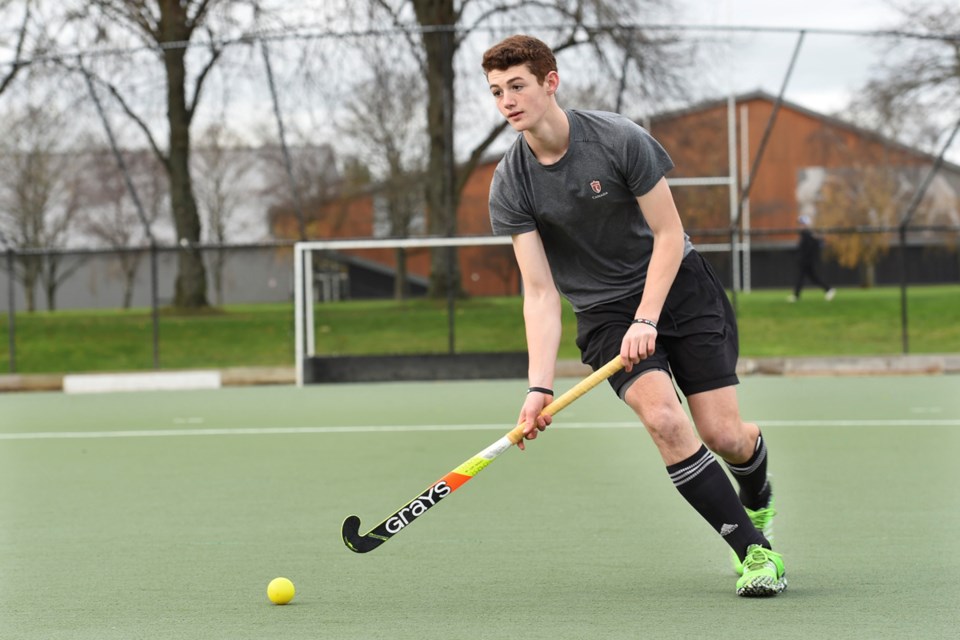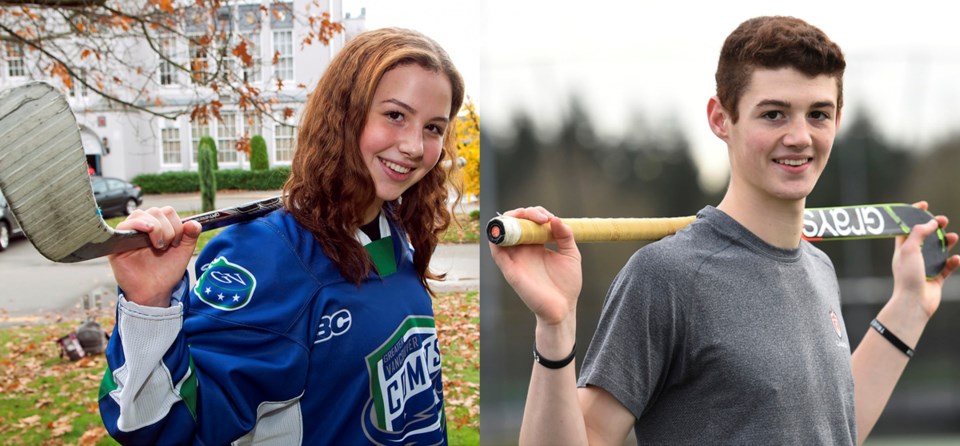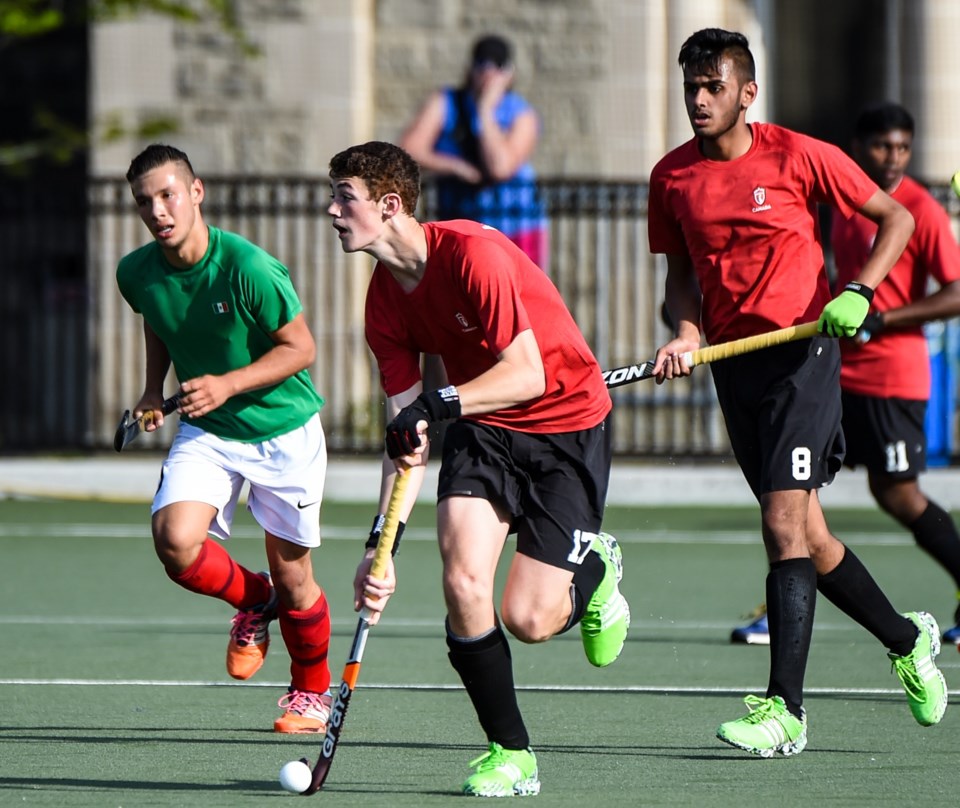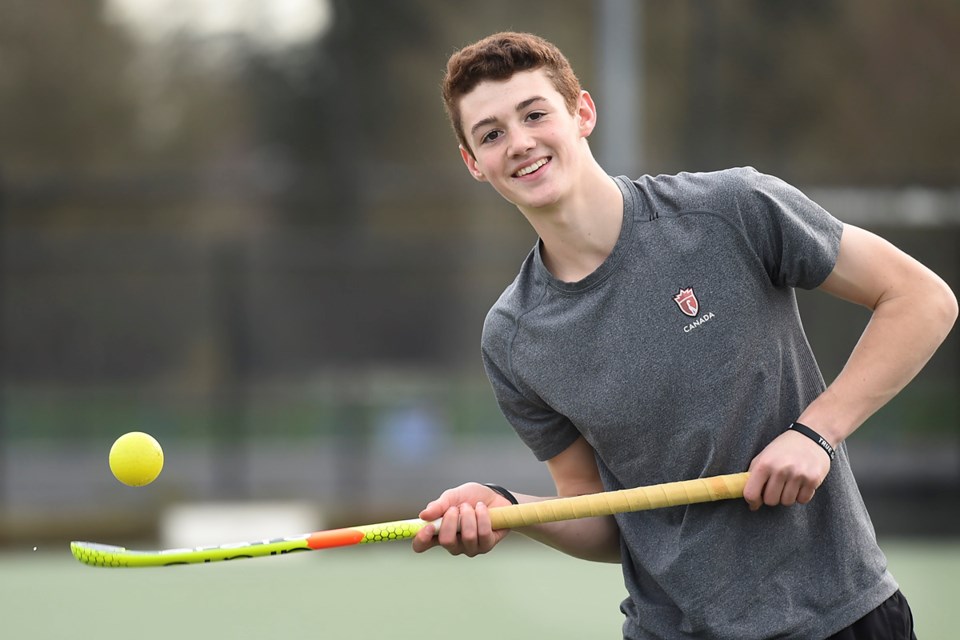Hockey players don’t know what they’re missing. Ice hockey players, says Jamie Wallace, can learn a lot from Canada’s other hockey, the one played on a giant turf field in sneakers with a hard little ball and an even harder, hooked stick.
“My skills in ice hockey improved so much from playing field hockey,” said Wallace. “It’s a really good sport for your hands and fitness.”
For nearly eight years, 17-year-old Wallace played both sports, crossing over from the rink to the pitch. Being right-handed was a significant advantage since players in the outdoor game can only handle the ball with the right side of the stick face. A centre on the ice, it was for the same reasons he played midfield on the turf.

“I like to get involved on both ends of the field. Even though it entails more running or skating, I want to be involved in every play,” he said.
Shooting is more like a golf shot than a slap shot, he said, and being nearly six-foot-four is an advantage on the ice but not on the turf.
“I hope I’m not still growing,” said the teenager. “I have to bend down so much, I can’t see any of the field or where to dribble. It’s one of those things you can complain about and see it as a disadvantage, but in a lot of ways, it is an advantage. People are surprised how I can overtake them from so far away and my reach means I can tackle from farther away, and I get a lot more power.”
Modestly, Wallace doesn’t describe himself as a natural, but his cross-over ability and on-field vision was evident from the beginning. He preferred the space on the larger playing surface, the tactics of the 11-a-side game and the complex team strategy. He also raved about the tight-knit “family” that spans the entire country.
“Everyone knows each other and are separated by just a name or two. It is a community of a few thousand so, in Canada, you feel that by playing in this sport you’re part of something huge. If somebody passes away, everybody feels like they have known then personally.”
Because of the relative seamless and enjoyable transition from ice to field, the hockey player found himself rising in both sports. He played for Â鶹´«Ă˝Ół»Minor and was optimistic he’d be called in the WHL bantam draft. Similarly, he was playing on the provincial team for Field Hockey BC and was scouted by Team Canada.
Hockey head wounds
The senior at St. George’s school always aspired to play sports at the highest level possible. His felt his ambitions were being realized. “One of my goals was to be a high-level athlete, especially an Olympian,” said Wallace.
That’s when he got a concussion.

Read more:
Playing for B.C. at the national field hockey tournament in Ontario over three years ago, an opponent’s stick flew up and hit Wallace in the face. He was out for half a year, sidelined and at risk of falling behind his peers, particularly in the competitive, hyper-drive world of junior hockey.
When he finally returned to the field, he was again hit in the head, which brought back on a relapse and all the painful symptoms of a brain injury.
“Hockey is a really tough sport,” he said. “It’s fast and physical and rough.”
While he recovered, Wallace took stock of his priorities. For him, the pitch was it.
“I felt that field hockey would give me the best change to become an Olympic athlete and a high-performance athlete. I really enjoy the sport,” he said. “I decided I would switch my focus full time on field hockey.”
Call of the Red Cariboo
Wallace made his debut with Team Canada in at the Junior Pan American Games earlier this year in Toronto. He was the youngest player on the roster at the age of 16, a favourable distinction that granted him the honour of wearing the captain’s armband in the team’s final game of the tournament, which was also the gold medal final.
“We had hundreds of Canadian fans cheering us on,” he said of the championship match against Argentina on May 28.
Ěý
No better way than to re-live the excitement from the Junior Pan Ams in Toronto. Men's Junior World Cup is 1 week away!
— Field Hockey Canada (@FieldHockeyCan)
Ěý
Wallace didn’t learn about the arm band tradition until moments before the match. “That was a shock and I definitely tried not to if affect my game too much,” he said. Text messages from across the country came flooding in when fans and players realized Wallace was selected as Canada’s captain.
The Canadians to the country that later won men’s field hockey gold at the Rio Olympic Games.
“We got a little ahead of ourselves,” said Wallace. “We needed to play our game but we got caught up in the moment. It showed us how far we have to come as a team if we want to do well.”
The silver medal qualified the team for the U21 men’s hockey World Cup in Lucknow, India. They fly out today for the tournament that runs Dec. 8 to 18.
Canada’s senior men’s team is ranked 12th in the world, with Australia, Argentina and the Netherlands topping the table. Canadian hockey is played a lot like Canadian hockey: physical, dogged and direct. The national team embraced the Red Cariboo as its emblem.
“We consider ourselves to be a gritty team,” Wallace said of the junior squad. “We pride ourselves on being one of the hardest-working teams.”
Three core values define their mindset, he added. “Heart is trying to give it our all and not be out-worked. Trust is believing in our teammates, the coaches and the game plan. And, professionalism is making sure we train well, eat well and do everything a professional athlete should be doing. Those are the things our team has been priding ourselves on for the past 16 months.”
Â鶹´«Ă˝Ół»represents at the World Cup
On a roster of 18, only four players on the U21 men’s national field hockey team are from outside B.C. and the rest are from the Lower Mainland, including four Vancouverites.
In addition to Wallace, they are Angus Grauer, Thomson Harris and Rajan Kahlon. The team's head coach, Indy Sehmbi, is also from Vancouver. He is the athletic director at Eric Hamber secondary in South Cambie.
A graduate of West Point Grey Academy, 21-year-old Grauer is the goalkeeper for the UBC Thunderbirds and will make his debut in net for Canada.
Harris, an elite cross-country runner when he was a Kitsilano Blue Demon, plays for the Â鶹´«Ă˝Ół»Hawks and is a freshman at UBC.
Kahlon is still in high school at Magee secondary and plays with the United Brothers club team. He and Harris won a silver medal for Canada at the Junior Pan American Championship in Toronto this spring.
Playing the hosts
Later this month, Canada will play their first match of the World Cup against India in the opening day of the tournament on Dec. 8.
It’s kind of like travelling to Barrie, Ont. to play Canada on the first day of the men’s world junior ice hockey championship. Except thousands more spectators in the host country will tune in to watch the field hockey match.
“They have been hyping it up for the past three years. They will have a really good team,” said Wallace. “That is the game most of the guys are really excited for. We are expecting big crowds, lots of noise. It will be a challenge for sure, but we’re trying to stay calm, stay composed. We’re scouting the team and getting to know the players. Hopefully we are capable of something special.”

Canada is in Group D with India, South Africa and England. The top two teams advance to the quarterfinals on Dec. 14.
Follow the tournament results .
Twitter:



